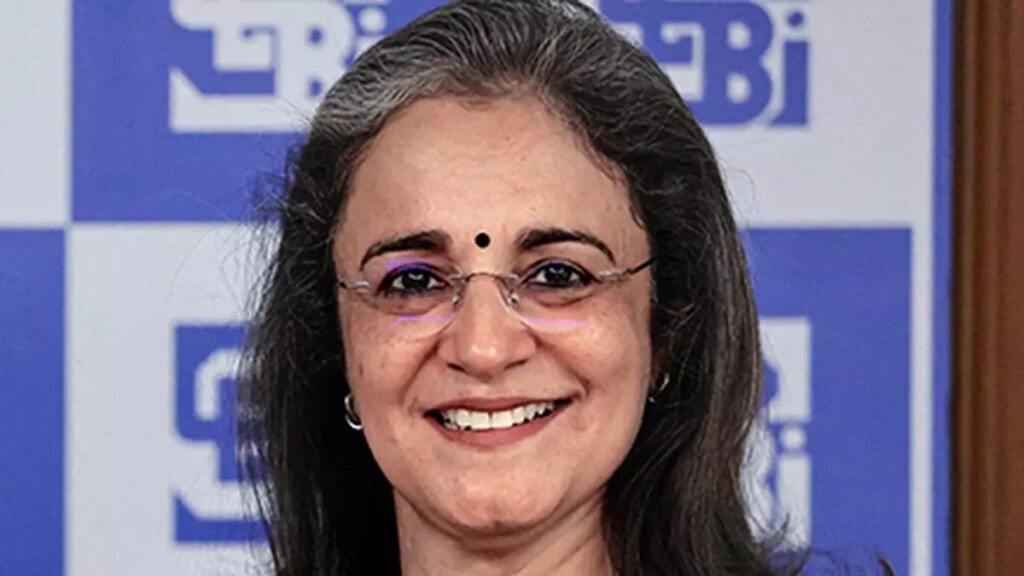Nearly 600 orders and 200 consultation papers. All in a span of three years. Madhabi Puri Buch’s tenure as SEBI chief may have ruffled a few feathers but the frenetic pace of directives is sure to leave a lasting imprint on the regulatory terrain. All along, the first woman and non-bureaucrat to lead the capital markets regulator has tried to inculcate a culture that is more closely aligned with the corporate world, with a data-driven approach and thrust on technology.
Buch completes her three-year term on March 1, with the possibility of her being given an extension appearing slim, if industry grapevine is to be believed. Frontrunners for the post include Finance Secretary Tuhin Kanta Pandey, Department of Economic Affairs Secretary Ajay Seth and Oil Secretary Pankaj Jain, reports suggest.
One of Buch’s landmark initiatives has been the phased introduction of a shorter settlement cycle, providing faster access to funds and securities. Despite resistance from foreign portfolio investors, India successfully transitioned to T+1 settlement in 2023 (from T+2), ahead of countries such as the US and Canada. A shift towards same-day settlement is on its way as well.
“The reform positioned India among the few global markets to adopt expedited settlements, enhancing liquidity, reducing counterparty risk, and increasing market efficiency,” said Sanjay Israni, Partner, Desai & Diwanji.
“Her reliance on empirical evidence for taking policy decisions as well as secondary market reforms were her key achievements,” said Anil Choudhary, Partner, Finsec Law Advisors.
Retail interest
Under Buch, the regulator has implemented key reforms to safeguard retail investors. Last year, SEBI introduced six measures to curb the frenzy in index derivatives, reducing the number of weekly options contracts to one per exchange and raising the minimum contract size. The regulator has taken a series of steps to prevent misuse of client funds by brokers and is moving towards an Asba-like settlement for the secondary market, which will allow investors to block funds in their bank accounts instead of transferring them to a broker.
Mutual funds have been brought under the ambit of insider trading regulations. Fund houses will now be offering monthly SIPs as low as ₹250, targeting investors in smaller towns with an aim to promote financial inclusion. SEBI has also cracked down on frontrunning and market abuse practices.
Other measures
In 2022, SEBI introduced the KPI framework for IPO-bound companies, mandating disclosure of past transactions and fundraising. It has allowed an optional pre-filing mechanism, allowing mainboard issuers to confidentially file a draft offer document for review, without immediate public disclosure.
The regulator has recently approved a new asset class allowing asset managers to offer higher-risk strategies to investors with a minimum investment threshold of ₹10 lakh.
Introduction of micro, small and medium REITs, dematerialisation of AIF units, push for for social stock exchanges and stricter norms for related party transactions were some of the other key initiatives during Buch’s tenure.
In the past year or so, SEBI has turned its attention to ease of doing business and created standard fora to collaborate more closely with industry bodies.
Setbacks
The regulator has faced criticism on regulatory overreach and delays in concluding high-profile investigations, especially those pertaining to the Adani Group.
“The ease of doing business has suffered due to frequent intervention by SEBI on matters related to listed companies and market intermediaries,” said Finsec Law Advisors’ Choudhary.
He added that the regulator has been low on enforcement standards and has suffered setbacks in major cases including NSE co-location, Karvy Stock Broking and Reliance Industries as well as several insider trading matters in SAT and the Supreme Court.
Buch found herself on the backfoot last year after US-based short-seller Hindenburg Research alleged that she had a conflict of interest in investigating the Adani Group matter and that she and her husband held stakes in obscure offshore funds used in the Adani money siphoning scandal. Despite a point by point rebuttal, the allegations attracted considerable political and media scrutiny.
“The Adani case highlighted the difficulty in maintaining the regulator’s impartiality and institutional credibility amid public scrutiny,” said Kunal Sharma, Partner, Singhania & Co.
Buch has also faced internal resistance to her efforts to professionalise SEBI, particularly in introducing performance-based targets and modern management practices. “Employee dissatisfaction and protests reflected the challenges of shifting the regulator’s hierarchical structure to a more corporate-style functioning, without disrupting established norms,” said Sharma.









